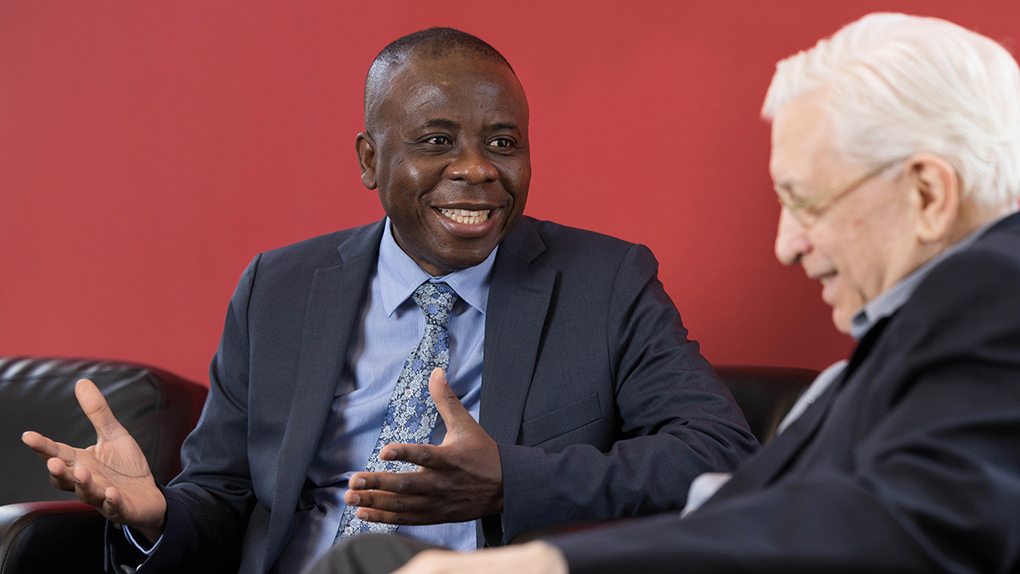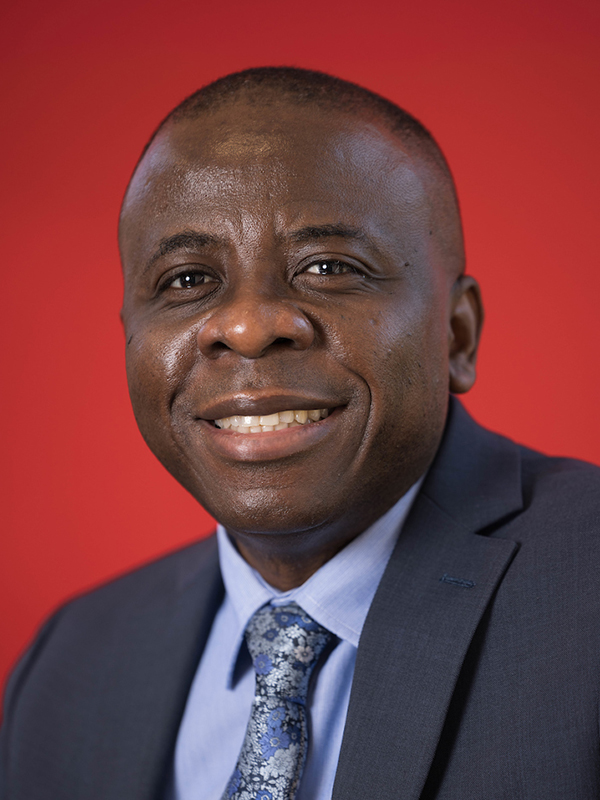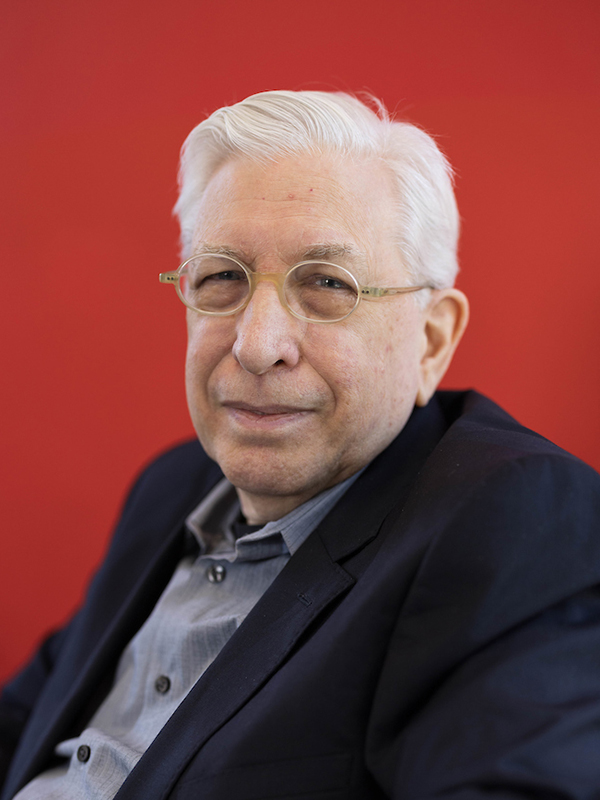
By Bethany Romano, MBA’17
A Moment of Serendipity
On a summer day in 2011, Joseph Assan hurried across campus at the historic University of York in northern England, where the Development Studies Association of the U.K. and Ireland was holding its annual conference. He had missed the morning sessions due to a delay in his flight from Dublin, but a kind woman at the registration desk handed him a map with directions to the conference lunch location.
“I was too hungry to follow the map,” Assan recalls with a laugh, so he approached a gentleman who was leaving the building and heading across the street.
“Excuse me, are you here for the DSA conference? Do you know where the luncheon is?” Assan called out. In a stroke of luck, the man was heading there, too, and invited Assan to join him.
“That man turned out to be Larry Simon,” says Assan. Laurence Simon, then the director of Heller’s Sustainable International Development (SID) program, was there with a group of SID colleagues in hopes of recruiting a new faculty member.
At the time, Assan was an assistant professor at Trinity College in Dublin. He and his wife lived in the U.K. with their young daughter and were expecting a second baby. A few family members from back home in Ghana had also relocated to the U.K., and Assan had no interest in pursuing a faculty position in the U.S., where he perceived there were no close academic colleagues, friends, or relatives he could collaborate or associate with.
“I said to Larry, ‘You guys came to the right place, you’ll meet some excellent candidates here,’ and left it at that.
“At least, that’s what I tried to say.”

Ghana’s Development Story
In 1957, the Gold Coast became the first sub-Saharan African nation to achieve independence from British colonial rule, and the Republic of Ghana was born. For 136 years, the British had extracted and exported vast quantities of Ghana’s rich natural resources, shipping raw materials to Europe to be processed into manufactured goods. Almost no private industry existed in Ghana, and the few factories present were European-owned.
Ghana’s first president, Kwame Nkrumah, was intent on industrializing the nation and modernizing its economy. Over time he built highways and airports, school systems and universities, factories, and manufacturing/processing industries. He even commissioned a new city – called Tema – with a deep-sea port.
Assan and his siblings were born in Tema, and their father worked in the port as a civil servant.
“Growing up, our parents would tell us the story,” Assan says. “They told us how the government built Tema from scratch – it’s a big city now – and about these development projects. The need for employment, education, leadership and the importance of having Africans in leadership positions in the new government, the value of African unity, with an Africanistic perspective and approach.”
In this way, international development has been part of Assan’s story from the very beginning.
A Scholar of Development Practice
As a child, Assan excelled academically, and because he was always advocating for others, his parents thought he might become a lawyer. (“Or maybe it’s because I talk so much,” he jokes.) At age 12 he was accepted to a top-tier boarding school, St. Augustine’s College, Cape Coast, where he befriended classmates who had grown up in poor, remote areas of the country.
“Tema is an affluent city, a working-class society not unlike what you see in Massachusetts,” he explains by way of comparison. “I had classmates at boarding school who taught themselves everything by reading textbooks because they didn’t have teachers. That was eye-opening.”
Assan studied science in high school and received a bachelor of science with honors in agriculture at the University of Cape Coast. He then worked with the Hunger Project, a New York-based development organization with projects in Ghana as a project officer. Assan found great satisfaction working with poor, marginalized communities, but eventually, his mentors encouraged him to pursue graduate studies in international development.
He enrolled at the University of Liverpool in the U.K. It was his first time living abroad, and it proved a significant adjustment. From the dreary weather to the Scouse dialect of Liverpool, the culture shock was everywhere. He was encouraged and assured by his faculty advisor and mentor, Professor Bill Gould, that he would be fine because he was an excellent student and a rising star.
“It was cold in England – in multiple ways,” he says. “Long, dark winters and culturally, very different. Back home, foreigners would often remark about how friendly Ghanaians were but I thought they were just being polite. In Ghana, if a visitor came to my job looking for me, someone would greet them and personally walk them to my office. When I got to the U.K., my first day on campus they handed me a map. I had no idea where I was going, and I did not have a cell phone. I took the wrong bus and was very late for my first meeting with my faculty advisor.”
Navigating the British higher education system was also challenging. Remembering those years, he says, “I was an outlier. My colleagues were predominantly British, I was often the only Black person in the group, the only non-European. There were things I needed clarification on or ways that my approach and perspective differed from my British colleagues.”
Still, Assan thrived as a student and researcher. His fieldwork experience in Ghana sparked an interest in livelihood sustainability, youth employment, and migration – a research area he pursues to this day.
“When I was in the field, I’d go to some communities and see just children and old people, all the younger adults had left to find work. It’s striking to see a community where an entire generation is missing. I wanted to understand why.” Over the years Assan published extensively on the intersection between migration, sustainable livelihoods, climate change, and household well-being.After completing his PhD, he accepted a faculty appointment in Liverpool, and a few years later made his way to Trinity College in Dublin. As a junior faculty member, Assan made a special effort to support international students, hosting a popular series of events and workshops for students who had come to the U.K. and Ireland to study development.
“We organized training seminars/workshops on how to write a good introduction, develop a methodology chapter, how to do research from a distance. Those were problems I had encountered myself.”
Eventually, the Development Studies Association of the U.K. and Ireland invited him to join their scientific council, which helped plan their annual professional conferences – including the fateful 2011 conference in York.

An Invitation to Brandeis
Though Assan was not looking to uproot his young family and relocate to Massachusetts, Professor Simon, the founding director of Heller’s SID program, proved persistent in his recruitment efforts. Eventually, Assan submitted his application letter and CV, and was shocked to receive an invitation to interview at Brandeis.
“The rest is history, really,” he says.
On that visit, Assan was impressed by Brandeis’ warmth and casual culture, compared to the conservative, “old school” universities of the U.K. and Ireland. “I was also struck by the diversity at Heller, which is especially unique, as opposed to Dublin, which is predominantly very white,” he says. “I wanted to be a part of it.”
“I knew Joseph was a superb fit, and I anticipated that someday he would be an ideal candidate to take over as program director,” says Simon. “He brings not only deep experience in scholarship and development policy and practice, but the unique understanding that comes only from growing up within a culture and embedded in the history, struggles, and aspirations of its people.”
Assan was also energized by Simon’s vision for the Center for Global Development and Sustainability, in which he now serves as an associate director for Political Economy. His own research remained focused on migration – particularly among youth – and the many factors that drove people to leave home.
That line of inquiry has taken him down many academic rabbit holes over his career. He examined how climate change was impacting livelihoods – particularly agriculture – and driving migration from rural communities to cities. He explored why certain ethnic groups migrated more than others. And he studied the exploitation of migrant workers who had succeeded in finding paid work, only to experience abuse at the hands of their employers.
Assan supervises graduate students and research assistants in his work, and often co-authors academic articles with them. One recent example is an article on workplace exploitation of migrant youth in Ghana, published in Development in Practice in 2023 with former student Dinar Kharisma, PhD’19.
“Professor Assan has taught me how to conduct qualitative research, especially in developing countries,” says Kharisma, who is now a senior policy planner in Indonesia’s Ministry of National Development Planning. “He provides support for international students coming from the developing world and opens the opportunities to participate in professional research activities.”
Special support to international students
In the classroom, students celebrate Assan’s talent for enriching the learning experience by encouraging them to share their stories. Daniella Fernandes, MBA/MA SID’21, remembers it vividly, saying, “He deliberately draws on his students’ diverse perspectives and insights, particularly those of international students, to create a more profound understanding of our world’s interconnectedness. His genuine interest in our stories fosters an open dialogue that is unique to his classroom, where every student’s voice is heard and valued.”
Throughout his decade on the SID faculty, including his recent years as the program’s director, Assan has prioritized supporting international students at Heller, the vast majority of whom hail from developing countries.
“I remember my student days in the U.K. vividly,” he says. “It was such a transition for me, and I don’t think anyone can really prepare you for it. Some of my professors had worked abroad, so they had some idea of what it was like living in a developing/transition economy, but they came to that understanding from a place of privilege. It’s just different, being from that country/region yourself.”
Alumna Ziyanda Stuurman, MA SID’20, of South Africa, recalls Assan as “one of the warmest and most memorable faculty members from my time at Heller.” She adds, “The way he helped to build a community for students from the African continent was such an incredible part of the entire Heller experience.”
Assan recognizes that some students may feel more comfortable coming to him for help or support, or just to talk, because he shares some of their life experiences. He often helps students navigate homesickness, financial hurdles, cultural labyrinths, or family crises and bereavement back home.
“Many of them need support even if they don’t realize it,” Assan says. “Sometimes they’re just homesick. A lot of people don’t realize how hard homesickness is. I’m here to say ‘hang in there, you’ll be fine.’”
“He always made a point to check in on how we’re doing, not just academically, but also personally,” says former student Sena Gyamerah-Ako, MA SID’14, who now works at the Mastercard Foundation’s office in Accra, Ghana. “He was constantly making me aware of professional opportunities, encouraging me that I was capable, that I could take on those roles and do well.”
Today, as director of the SID program, Assan sees a dynamic and dedicated generation of young people entering the field. “Our students want to be at the forefront of what’s happening on the ground. For many of them, it’s personal – they are from the communities we’re discussing, places most impacted by climate change, violence, and/or poverty.
“I tell them, ‘Activism is good, but it’s not enough.’ We need strategic thinking, new ways of doing things. Sleeping dogs cannot continue to lie. And that’s why Heller has such a supportive community, which is so unique compared to other places: it offers students what they need to thrive so that they can get the mentorship, develop advanced skills, to go out and solve those problems.”
